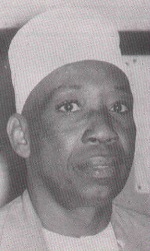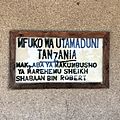Shaaban bin Robert facts for kids
Quick facts for kids
Shaaban Robert
|
|
|---|---|
 |
|
| Born |
Shaaban bin Selemani
1 January 1909 Vibamba village, Tanga
|
| Died | 20 June 1962 (aged 53) |
| Resting place | Machui, Tanga Region |
| Nationality | Tanzanian |
| Occupation | Civil servant, writer, poet |
| Years active | 1932–62 |
| Known for | kiswahili literature |
|
Notable work
|
Kusadikika |
| Spouse(s) | Amina |
| Children | 10 |
| Awards | Margaret Wrong Prize and Medal for African Literature |
Shaaban bin Robert (born January 1, 1909 – died June 20, 1962) was a famous Tanzanian writer. He was a poet, author, and essayist. Shaaban Robert worked hard to keep Tanzanian poetry traditions alive. Many people see him as one of the most important Swahili thinkers and writers in East Africa. He is often called the "poet laureate of Swahili" and the "Father of Swahili." This means he was seen as the best and most respected Swahili poet. He is also honored as Tanzania's national poet.
Contents
Who Was Shaaban Robert?
Shaaban Robert was born in a small village called Vibamba. This village is located south of Tanga City in Tanzania. At that time, Tanzania was known as German East Africa. His full birth name was Shaaban bin Selemani. The name Robert came from a British officer. This officer asked Shaaban's parents to name him after him. So, Robert was actually his second name, not his family name.
Shaaban Robert's Education
From 1922 to 1926, Shaaban went to school in Dar es Salaam. He did very well in his studies. He finished second in his class of eleven students. He received a School Leaving Certificate. This was part of the British colonial education system in Tanganyika.
Shaaban Robert's Career and Work
After finishing school, Shaaban worked for the government. He was a civil servant for many years. From 1926 to 1944, he worked as a customs official. He worked in different places across the country. Then, from 1944 to 1946, he worked for the Game Department. This department managed wildlife.
Later, from 1946 to 1952, he worked in the Tanga District Office. From 1952 to 1960, he was in the Survey Office in Tanga. He also worked closely with the Tanganyika African National Union (TANU). This was a political party that fought for Tanzania's independence. He also worked with Julius Nyerere, who became Tanzania's first president. Many of his experiences from his government jobs appeared in his writings.
During his life, Shaaban Robert received important awards. He won the Margaret Wrong Prize and Medal for African Literature. The British government also honored him. He was made a Member of the Order of the British Empire (M.B.E.).
Shaaban Robert's Ideas and Writings
Shaaban Robert was very important in promoting the Swahili language. He also fought for human dignity and fairness. He was known as a humanist. This means he believed strongly in the value and goodness of people. He worked for freedom and for men and women to be treated equally. He was also against unfair treatment based on race or religion in Tanzania.
Julius Nyerere, Tanzania's first president, greatly admired Shaaban Robert. He valued and supported Shaaban's intellectual work. Shaaban Robert respected both Muslims and Christians. This respect is even seen in his own names: Shaaban (a Muslim name) and Robert (a Christian name).
Shaaban Robert wrote many essays, books, stories, and poems. Some of his writings are still studied in schools and universities today. Some of his famous books include Maisha Yangu na Baada ya Miaka Hamsini, Kusadikika, and Wasifu wa Siti binti Saad. People are still finding and publishing his works. So far, 24 of his works are known.
Shaaban Robert's Lasting Impact
Shaaban Robert left a big mark on Tanzania. His work continues to inspire people.
Places Named After Shaaban Robert
- Shaaban Robert Secondary School: A school in Dar es Salaam is named after him.
- Shaaban Robert Street: A street in the center of Dar es Salaam is also named in his honor.
Images for kids
 | Delilah Pierce |
 | Gordon Parks |
 | Augusta Savage |
 | Charles Ethan Porter |



